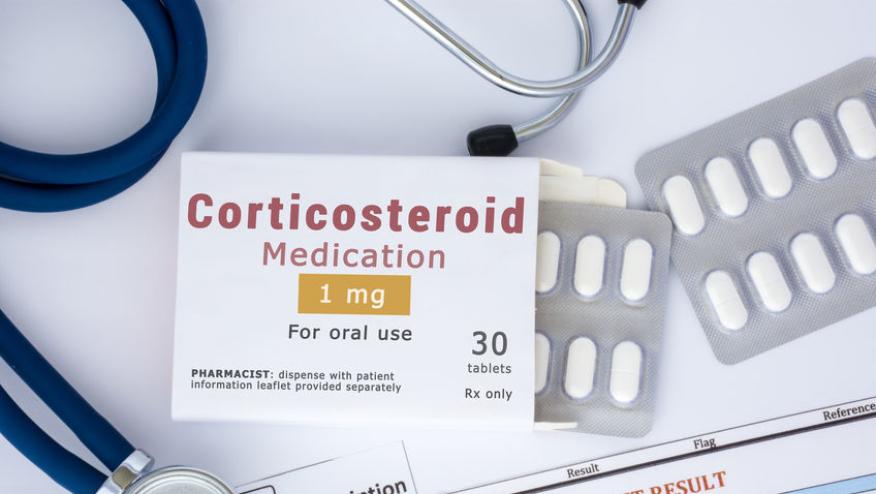Good Clinical Practice Recommendations on Glucocorticoid Withdrawal and Adrenal Insufficiency Save

The European Society of Endocrinology and Endocrine Society have jointly published a clinical guideline on the diagnosis and treatment of glucocorticoid-induced adrenal insufficiency, a topic of grave concern to all who employ glucocorticoids (GC).
It is estimated that at least 1% of the population using chronic glucocorticoid therapy, with at least some being at risk for glucocorticoid-induced adrenal insufficiency. This review discusses how the risk is dependent on the dose, duration and potency of the glucocorticoid, route of administration, and individual susceptibility.
Tapering glucocorticoids are a particular challenge as it is difficulty, prolonged and carries the risk of both steroid withdrawal or, rarely, adrenal insufficiency.
This clinical guideline shows that GC tapering can be more rapid within a supraphysiological range, followed by a slower taper when approaching physiological glucocorticoid doses.
The recommendations are worded as recommend (strong recommendation) and suggest (weak recommendation) and the evidence is qualifited as very low, low, moderate, and strong.
This is not a guideline but instead recommendations on good clinical practice based on the experience of the working group members.
This is a useful reference. Below are takeaway practice recommendations to the rheumatologist and others who regularly use GCs.
- We recommend that clinicians who implement treatment with glucocorticoids educate patients about various endocrine aspects of glucocorticoid therapy.
- We suggest not to taper glucocorticoids in patients on short-term glucocorticoid therapy of <3-4 weeks, irrespective of the dose. In these cases, glucocorticoids can be stopped without testing due to low concern for HPA axis suppression (moderate).
- Glucocorticoid taper for patients on long-term glucocorticoid therapy should only be attempted if the underlying disease is controlled, and glucocorticoids are no longer required. In these cases, glucocorticoids are tapered until approaching the physiologic daily dose equivalent is achieved (e.g., 4-6 mg prednisone).
- We recommend consideration of glucocorticoid withdrawal syndrome that may occur during glucocorticoid taper. If severe, glucocorticoid dose can be temporarily increased to the most recent one that was tolerated, and the duration of glucocorticoid taper could be increased.
- We recommend against routine testing for adrenal insufficiency in patients on supraphysiologic doses of glucocorticoids.
- Patients taking long-acting glucocorticoids (e.g., dexamethasone or betamethasone) should be switched to shorter-acting glucocorticoids (e.g., hydrocortisone or prednisone).
- If confirmation of recovery of the HPA axis is desired, we recommend morning serum cortisol as the first test. The value of morning serum cortisol should be considered as a continuum, with higher values more indicative of HPA axis recovery.
- the test indicates recovery of the HPA axis if cortisol is >300 nmol/L or 10 μg/dL and glucocorticoids can be stopped safely;
- if the result is between 150 nmol/L or 5 μg/dL and 300 nmol/L or 10 μg/dL, the physiologic glucocorticoid dose should be continued, and the morning cortisol repeated after an appropriate time (usually weeks to months);
- Duration of glucocorticoid therapy that poses risk for adrenal insufficiency – 3-4 weeks, or greater
- Dose of glucocorticoid therapy to pose risk for adrenal insufficiency – any dose greater than daily hydrocortisone equivalent of 15-25 mg (4-6 mg prednisone or prednisolone, 3-5 mg methylprednisone, 0.25-0.5 mg dexamethasone)
- Physiologic daily dose equivalent: Daily glucocorticoid dose equivalent to average daily cortisol production (15-25 mg hydrocortisone, 4-6 mg prednisone or prednisolone, 3-5 mg methylprednisone, 0.25-0.5 mg dexamethasone). Endogenous production of cortisol is estimated to be 9-10 mg/day. The above mentioned doses are based on an estimate of bioavailability.
Join The Discussion
This is one of the most practical posts I've read in quite a while. I especially like the part on how to tell how to know when it is safe to abruptly stop corticosteroids. Thanks, Jack and team










If you are a health practitioner, you may Login/Register to comment.
Due to the nature of these comment forums, only health practitioners are allowed to comment at this time.